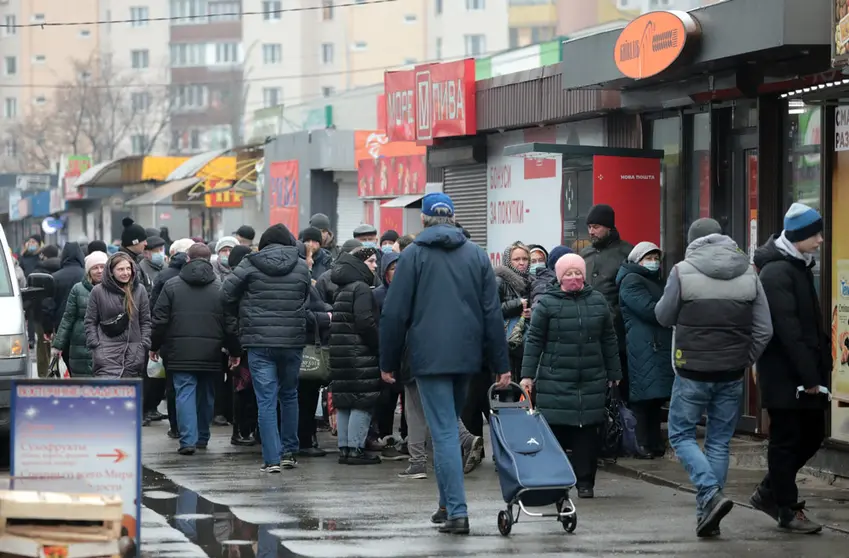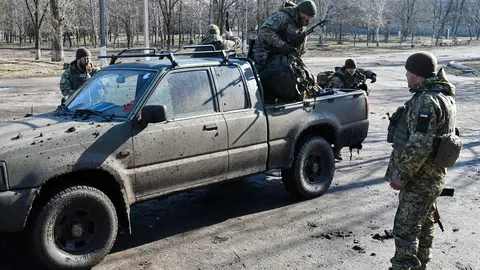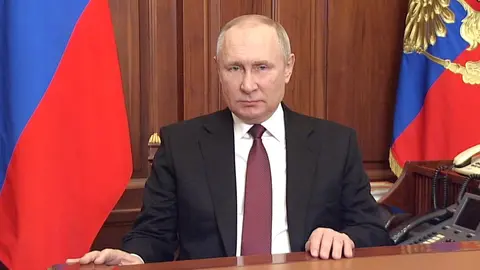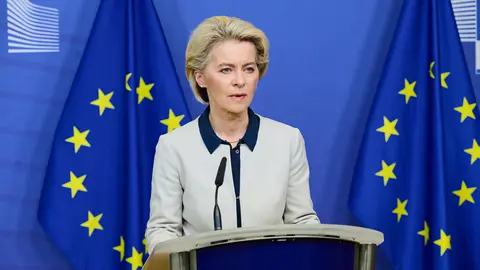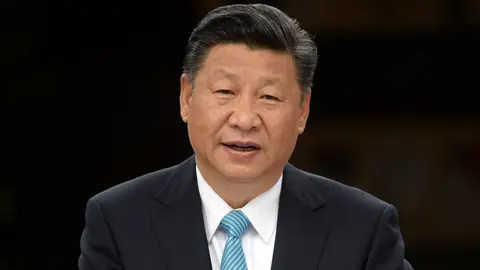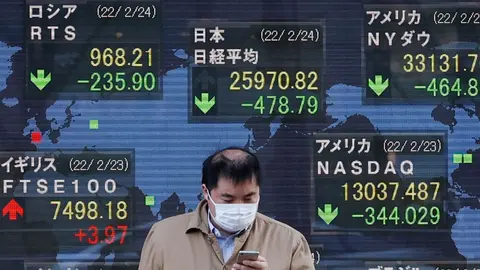Russia launched a multi-front offensive against Ukraine on Thursday that aimed to degrade and conquer its neighbour's military infrastructure by pouring tanks across the border and conducting airstrikes on facilities near major cities.
Russian President Vladimir Putin unleashed the long-feared assault in the early hours of Thursday, which Ukraine describes as a "full-scale invasion" using land, sea and air forces.
Dozens of Ukrainian troops have been reported killed so far, while explosions could be heard in some of the Eastern European country's biggest cities and residents of the capital Kiev were told to head to air raid shelters if possible.
Ukrainian President Volodymyr Zelensky called it "a declaration of war against the whole of Europe."
Zelensky said his troops were even battling Russian forces trying "to seize" the former nuclear plant in Chernobyl.
"We now have war in Europe on a scale and of a type we thought belonged to history," said NATO Secretary General Jens Stoltenberg.
Fierce fighting in Kharkiv area
The invasion came after weeks of high-level diplomacy to avert war failed. And by Thursday evening in Ukraine it remained unclear how far Russian forces would advance or what the end objective was.
Ukraine's General Staff said that as of 1100 GMT Russia had carried out 30 strikes on "civilian and military infrastructure."
It said "fierce fighting" was taking place near Kharkiv, a major city in north-east Ukraine that is not far from the Russian border.
Russian troops had been stopped in the northern Chernihiv region, which borders Belarus, the General Staff said.
Ukraine and NATO said earlier that Russian military convoys had crossed into the country via Belarus, whose government is a close ally of Russia.
The Russian army was also launching offensives from Ukraine's Black Sea peninsula of Crimea, annexed by Russia in 2014, towards the cities Kherson and Melitopol.
'De-Nazification' of Ukraine
Zelensky declared martial law throughout the country for an initial period of 30 days. He also cut diplomatic ties with Russia.
The "special military operation" was announced by Putin in an overnight address to the nation. He said he wanted the "demilitarization and de-Nazification" of Ukraine.
Putin claimed the Western-friendly government in Kiev posed a threat to the "very existence of [the Russian] state and its sovereignty."
A short time later, the Russian offensive began.
In the pre-dawn hours, explosions were heard in Kiev, Kharkiv and in Lviv, in the far west of the country near Poland.
Ukraine's defences knocked out
The Russian Defence Ministry said Ukraine's air defences were knocked out with "precision-guided" strikes. No airstrikes on urban centres had taken place, it said, claiming there was "no threat to the civilian population."
In the first hours of the invasion, the Kiev government reported at least 40 Ukrainian soldiers dead. Later it was said that at least five soldiers were killed in the crash of a Ukrainian military transport aircraft south of Kiev.
Russia's targets have included military ammunition depots, bases, airfields and a TV tower. There were also reports of army barracks attacked.
Russia tanks had rolled across the border to the Luhansk and Donetsk areas of Ukraine that are claimed by pro-Moscow separatists. Several small towns that had not been under rebel control were reported captured.
The separatists have sustained both military and civilian casualties, the head of the self-proclaimed Donetsk People's Republic, Denis Pushilin, told Russian state television, without giving a specific number.
No NATO combat troops to Ukraine
Nearly as soon as the attack began on the Western-friendly government in Kiev, the US and Europe threatened their reprisals.
European Union sources said the block was preparing new sanctions against Russia's energy, finance and transport sectors. The 27-member bloc already announced Wednesday sanctions against senior Kremlin officials, including Defence Minister Sergei Shoigu.
NATO said it was convening an emergency leaders summit on Friday and, for the first time in the alliance's history, activating defence plans for Eastern Europe.
"It will be a new Europe after the invasion we saw today," Stoltenberg said, calling Putin's moves "cold-blooded." But he said no NATO combat troops were in Ukraine or being sent there.
US President Joe Biden, who sanctioned Russia's financial sector earlier this week, said that Putin had "chosen a premeditated war" and that further consequences would soon come.
Biden was scheduled to deliver remarks on the crisis at 1830 GMT after holding a conference call with other G7 leaders.
German Chancellor Olaf Scholz said "February 24 is a terrible day for Ukraine and a dark day for Europe." His foreign minister said Russia will be hit with the "full package of the most massive sanctions."
This week, Scholz had announced Berlin was halting certification of the Russia-to-Germany Nord Stream 2 gas pipeline, in a blow to Russia's energy sector.
Putin denounces a 'genocide'
To help justify his actions, Putin has claimed, without any evidence, that Ukraine is carrying out a "genocide" against the Russian-speaking population in the east.
He said this week that the ex-Soviet republic is not a legitimate state and the government in Kiev is a "puppet" of the US.
Putin has offered a solution to defusing tensions that has been roundly rejected by the West. He insists on the demilitarization of Ukraine, a renunciation of Ukraine's future membership in NATO and removal of NATO forces in Eastern Europe.
After months spent amassing troops on Ukraine's borders, Putin on Monday announced that Russia would recognize the independence of the two breakaway areas of Ukraine and that Russian troops would be sent there. At that time, Putin said his forces would conduct "peacekeeping duties."
On Tuesday, the Russian leader said the long-stalled Minsk peace plan for eastern Ukraine, which seen war between Ukrainian forces and separatist rebels since 2014, was dead.







